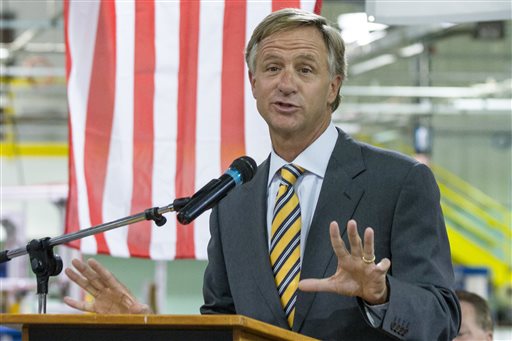NASHVILLE - Tennessee Gov. Bill Haslam's suggestion this week that he may soon submit a proposal for Medicaid expansion in Tennessee received some blowback from a fellow Republican leader in the Legislature on Friday.
Senate Majority Leader Mark Norris, R-Collierville, issued a statement to question the Republican governor's suggestion that a proposal could crafted by this fall.
"It seems the governor is not very serious about whatever he has in mind regarding Medicaid expansion, because he hasn't conferred with the General Assembly," Norris said.
State lawmakers earlier this year passed a bill to require the governor to obtain legislative approval before he can expand Medicaid under President Barack Obama's health care law. Supporters dubbed the measure that Haslam later signed into law the "Stop Obamacare Act."
Pennsylvania on Thursday became the 27th state to agree to accept Medicaid expansion under the federal heath care law, and the ninth run by a Republican governor.
Haslam told reporters on Thursday that he has begun talks with U.S. Health and Human Services Secretary Sylvia Burwell, but acknowledged that any plan would require the support of a majority of state lawmakers in both chambers.
"It's nice to say let's put politics aside, but at the end of the day you also have to get it passed in the Legislature," he said.
Haslam has been heavily criticized by Democrats for refusing last year to take $1.4 billion in federal funds to cover about 180,000 uninsured Tennesseans under the terms the money was offered.
The governor has sought to negotiate a special deal for Tennessee that would allow the state to use the federal money to subsidize private insurance and promote healthier lifestyles through a series of incentives and to create a health provider payment system that stresses rewards for keeping patients healthy through preventative care and management of chronic illnesses.
But Haslam has declined so far to give specifics about what his plan would entail and earlier this year urged federal health officials to make a counterproposal that would be acceptable to both sides.
"They never really came back with anything," Haslam said Thursday, prompting him to once again work on presenting his own plan with the advantage of knowing what has been approved and rejected in other states.
Haslam said his proposal would involve something that "financially works for the state long-term and ... is something that we feel really does move health care ahead for everybody and doesn't just expand coverage."

